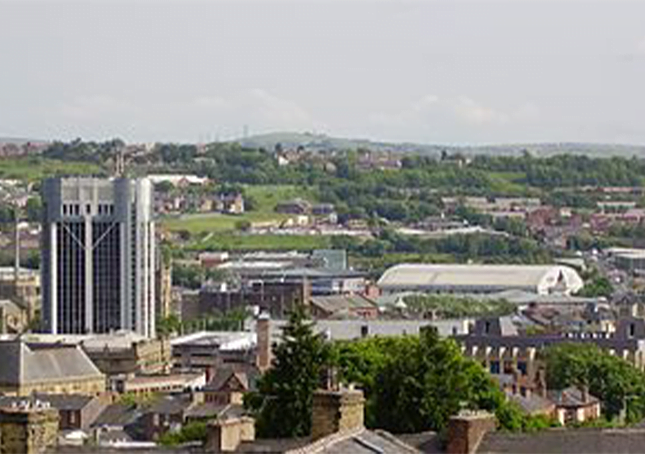Blackburn

Blackburn /ˈblækbərn/ (About this soundlisten) is a large industrial town located in Lancashire, England, north of the West Pennine Moors on the southern edge of the Ribble Valley, 8 miles (13 km) east of Preston and 20.9 miles (34 km) NNW of Manchester. Blackburn is bounded to the south by Darwen, with which it forms the unitary authority of Blackburn with Darwen; Blackburn is its administrative centre.
At the 2001 census, Blackburn had a population of 105,085,[2] whilst the wider borough of Blackburn with Darwen had a population of 148,850.[5] Blackburn had a population of 117,963 in 2011,[1] with 30.8% being people of ethnic backgrounds other than white British.
A former mill town, textiles have been produced in Blackburn since the middle of the 13th century, when wool was woven in people’s houses in the domestic system. Flemish weavers who settled in the area in the 14th century helped to develop the woollen cottage industry. The most rapid period of growth and development in Blackburn’s history coincided with the industrialisation and expansion of textile manufacturing.
Blackburn’s textile sector fell into decline from the mid-20th century and subsequently faced similar challenges to other post-industrial northern towns, including deindustrialisation, economic deprivation and housing problems. Blackburn has had significant investment and redevelopment since 1958 through government funding and the European Regional Development Fund.
Blackburn was recorded in the Domesday Book as Blacheborne in 1086. The origins of the name are uncertain. It has been suggested that it may be a combination of an Old English word for bleach, together with a form of the word “burn”, meaning stream, and may be associated with a bleaching process. Alternatively, the name of the town may simply mean “black burn”, or “black stream”.
There is little evidence of prehistoric settlement in the Blakewater valley, in which Blackburn developed. Evidence of activity in the form of two urn burials has been discovered from the Bronze Age in the hills around Blackburn.
In 1879, a cinerary urn was discovered at a tumulus at Revidge, north of the town; another was excavated in 1996 at Pleasington Cemetery, west of the town, by gravedigger Grant Higson. The presence of a sacred spring—perhaps in use during the Iron Age—provides evidence of prehistoric activity in the town centre, at All Hallows Spring on Railway Road.
